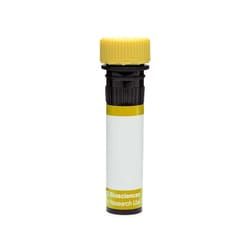7225535
BD Horizon™ CD326 Rat, anti-Mouse, RY586, Clone: G8.8, BD Horizon™
Rat Monoclonal Antibody
Manufacturer: Fischer Scientific
The price for this product is unavailable. Please request a quote
Antigen
CD326
Applications
Flow Cytometry
Host Species
Rat
Target Species
Mouse
Clone
G8.8
Conjugate
RY586
Regulatory Status
RUO
Primary or Secondary
Primary
Description
- Description The G8.8 monoclonal antibody recognizes CD326/Ep-CAM (Epithelial Cell Adhesion Molecule), also known as gp40 in the mouse and by a variety of names (including GA733-2, CO17-1A, and EGP) in the human. In the mouse, Ep-CAM is a 40-42 kDa cell-surface type 1 transmembrane glycoprotein expressed on thymic epithelial cells, thymic dendritic cells, immature thymocytes, a small subset of peripheral T lymphocytes, intestinal epithelium, kidney-collecting tubule epithelium, keratinocytes, Langerhans cells and lymph node and splenic dendritic cells
- Profiles of Ep-CAM expression on fetal thymocytes and on the CD4[-] CD8[-], CD4[+] CD8[+], CD4[-] CD8[+], and CD4[+] CD8[-] subsets of adult thymocytes have been published. In unrelated studies, mouse Ep-CAM mRNA was detected in tissues containing epithelial cells (kidney, stomach, intestine, lung, and thymus) and in plasma cells and plasmacytomas, but not in heart, muscle, liver, brain, spleen, B lymphomas, or pre-B lymphomas. Ep-CAM is a Ca[2+] independent homophilic adhesion molecule that is proposed to play roles in the development and normal function of epithelial tissues and in the progression of carcinomas.
